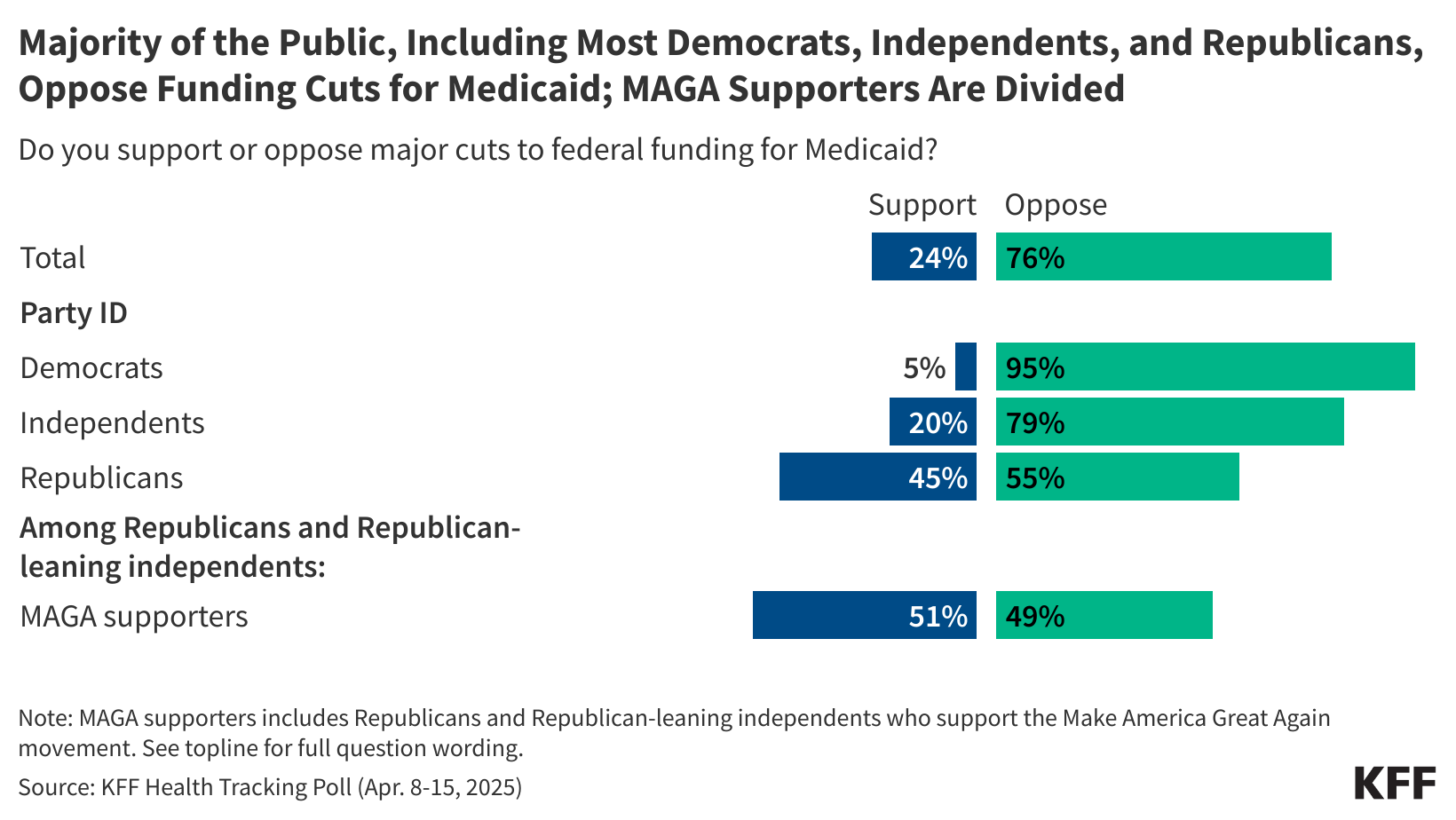As the Trump administration and Congress pursue broad cuts to federal health agencies and budgets, opposition to deep budget and staffing cuts mainly falls across party lines, according to a new KFF Health Tracking Poll.
The poll was conducted the week of April 8-15, online and by telephone, among a national representative sample of 1,380 U.S. adults in English (1,322) and in Spanish (58).
KFF found that across a range of questions, large majorities of Democrats and Independents oppose the administration’s major cuts to federal health agencies and programs, while Republicans are more supportive. Those who identify with President Donald Trump’s Make America Great Again (MAGA) movement are even more supportive of cuts to health agency’s staff and budget but still split on cuts to funding for Medicaid and a few other programs.
For example, most of the public (61 percent), including large shares of Democrats (89 percent) and independents (67 percent), oppose major health spending and staff cuts at federal health agencies. In contrast, MAGA supporters overwhelmingly support such cuts (78 percent), while Republicans and Republican-leaning independents who don’t align with MAGA are divided (48 percent support the cuts, 52 percent oppose).
Similarly, most (59 percent) of the public, including large majorities of Democrats (92 percent) and independents (65 percent), say the Trump administration and its Department of Government Efficiency (DOGE) have been “recklessly making broad cuts to programs and staff.”
In contrast, the vast majority of MAGA supporters (87 percent), and a narrower majority of non-MAGA Republicans and Republican leaners (57 percent), say that the administration is “carefully making cuts to programs and staff to reduce fraud and waste.”
On Medicaid, three quarters (76 percent) of the public say they oppose major federal funding cuts.
Fifty-five percent of Republicans, as well as larger majorities of Democrats (95 percent) and Independents (79 percent), oppose major Medicaid cuts. MAGA supporters are closely divided on major funding cuts to Medicaid, with similar shares in favor (51 percent) and opposed (49 percent) to major cuts.

Public views on specific cuts to programs, agencies
The poll also gauges the public’s views on federal funding cuts for other health programs. In each case, more than six in 10 oppose specific federal health cuts. For example:
- About three quarters (74 percent) oppose major cuts to states for mental health and addiction prevention services. This includes a narrow majority of Republicans (58 percent), and large majorities of Democrats (89 percent) and Independents (75 percent).
- Seventy-one percent oppose major cuts to funding to track infectious disease outbreaks. This includes half of Republicans (51 percent), and large majorities of Democrats (89 percent) and Independents (74 percent).
- Seven in 10 (69 percent) oppose major cuts to research at universities and medical centers. This includes large majorities of Democrats (92 percent) and Independents (69 percent). In contrast, most Republicans (56 percent) favor such cuts.
- Nearly two thirds (65 percent) oppose reduced federal funding to help people pay the premiums for health coverage purchased through the Affordable Care Act marketplaces. This includes 88 percent of Democrats and 65 percent of Independents. Sixty-one percent of Republicans favor such cuts.

Most of the public also opposes major staffing cuts to key federal health agencies such as the Department of Veteran Affairs (74 percent oppose), Centers for Medicare & Medicaid Services (67 percent), the Centers for Disease Control and Prevention (63 percent), the Food and Drug Administration (63 percent), and the National Institutes of Health (62 percent).
Republicans and MAGA supporters narrowly oppose major staffing cuts for Veterans Affairs but favor them at each of the other agencies.
Public views on fraud and waste in government health programs
About half of the public say that fraud, waste, and abuse are a major problem in Medicaid (52 percent), Social Security (51 percent), and Medicare (50 percent), and a slightly larger majority say it is a major problem in private health insurance (57 percent).
Partisans choose different groups when asked who is most responsible for fraud, waste, and abuse in government health programs. About half of Democrats (49 percent) say private health insurers are most responsible, while Republicans most often name government workers (42 percent). Fewer across partisans blame people enrolled in the programs or hospitals, doctors and other health providers.
